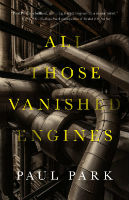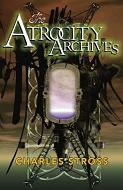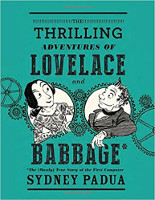 Paul Park is an American SF and Fantasy writer, living in Massachusetts. He’s the author of the Starbrige Chronicles and the Princess of Roumania series, plus a number of stand-alone novels; and has been nominated for a number of awards, including the Nebula and the World Fantasy Award. He teaches SF writing at Williams College, and has been a teacher at several Clarion workshops.
Paul Park is an American SF and Fantasy writer, living in Massachusetts. He’s the author of the Starbrige Chronicles and the Princess of Roumania series, plus a number of stand-alone novels; and has been nominated for a number of awards, including the Nebula and the World Fantasy Award. He teaches SF writing at Williams College, and has been a teacher at several Clarion workshops.
All Those Vanished Engines is an unusual book for me, one which I picked up on a whim, based on the blurb and the cover; and one I approached without much in terms of expectations (except in the hope for a good/interesting read, of course!). I was, in the end, in equal parts thrilled, bewildered, and disappointed with what I found, I guess.
The book is split into 3 separate parts, which, initially, don’t seem to have anything to do with each other, but upon closer inspection betray small, but significant linkages and interdependencies (as well as inconsistencies, but that’s part of the programme here).
The first story plays in an alternate past, in Petersburg, Virginia. Paulina is living with Gram, a formidable if sometimes confused old lady, and her servant Andrew. She has been given a bracelet (this one keeps re-appearing across the stories), made from braided gold and Elephant hair, and obtained in Ceylon by her cousin, a Confederate veteran and hero of the Battle of the Crater. This is a world where the Confederates did not lose the war, and where a treaty is in place between the southern states (apparently led or controlled by the UDC - the United Daughters of the Confederacy) and the Yankee Empress. The northern leaders had to provide babies, to be brought up by the UDC, as a guarantee, and we learn that Paulina is one of those. But now the Yankees seem to have broken the terms of the truce, and the armies are on the march again…
Paulina has been writing a story, set in a future and distant (or is it?) Petersburg, where there is no trace of the Confederacy, and humanity is battling Aliens from Mars (who appear to be using steam machinery), in a wintery landscape, at a crater from an explosion (yup, the crater, and the battle there, also keep recurring). This piece of SF contains a protagonist called Paulina, who is telling a story about a historical Paulina, living in a Confederate Petersburg…
If you detect some kind of circular reference here then you’d be absolutely correct. For I while I thought I was reading three stories which kept writing each other, but upon re-reading I’m fairly sure it’s only two. Nevertheless. The writing has the disorienting, disconnected quality of a dream; with its own, twisted and fluid logic. The stories are running around each other, like a braid. The don’t stay put, or consistent, or even separate…
“How can we live”, Paulina thought, “when memory tells us one thing, reality another, and imagination a third? How can we travel through the world?”
I found that it was not worth to over-think, over-analyse the stories here - there are interesting historical connections and interactions, “in fact, in memory, and in the imagined present”, as Park puts it. Reading this part of the book was an exhilarating, destabilising ride, like dancing on a landslide.
The 2nd story is about an artist and writer, and about an Art project set up in a Museum, which is an old boiler/engine house from WW2. It used to house production facilities for something which is never exactly spelled out, and research projects, top secret ones, which are never fully explained. Something to do with sound, with material shipped from La Paz, with weapons grade material.
But maybe all of this is only a story, invented by the writer, reflecting his life, his family, his connections? Or simply an extrapolation deeper into fantastical fictional territory from his installation of the same name with Stephen Vitiello?
It talks about the impact of fiction on reality, and the mirroring of this relationship. The fluidity of the storytelling can be faintly annoying - especially if you’d like to learn more about something, or simply follow a story or protagonist through to the end… and cannot. Things morph and deform when you/the author touch them; as if the process of observing the story and settings changes them (yes, that’s a Quantum Physics reference).
“Every memoirist and every historian should begin by reminding their reader that the mere act of writing something down, or organising something in a line of works, involves a clear betrayal of the truth.”
The final part of the book seems to be heavily autobiographical, it’s about a writer who teaches writing, and about his environment. But of course this also does not stand still, but keeps morphing and shifting, both with trips down memory lane as well as different stories and developments told from different viewpoints, and thus changing events.
It is (and, in the end, I suspect the entire book is) a story about writers. About writing. And about being written, being changed by being written. About the fluidity of reality, especially when it is written, written about, written down.
For all its cleverness, for all its intertwined and interconnected stories and threads, I rarely found the book to be immersive, never mind escapist. Yes, there are parts which grab you and take you along, but for entire lengths of it I was shown around, to admire the clever edifice, and then take my leave.
Either this is going completely over my head (and how would I know, in that case?), or is simply something which did not fully capture me.
A writer’s writer writing about writing? Or am I unfair here? One for fans of clever writing, that’s for sure!
More Paul Park
Title: All Those Vanished Engines
Author: Paul Park
Reviewer: Markus
Reviewer URL: http://thierstein.net
Publisher: TOR
Publisher URL: http://www.tor-forge.com
Publication Date: 2014
Review Date: 1400807
ISBN:9781466847163
Pages: 188
Format: ePub
Topic: Alternative History
Topic: Writing about Writing













